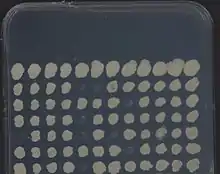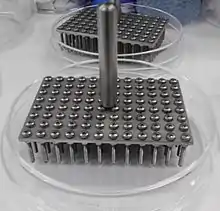Spot analysis
Spot analysis, spot test analysis, or spot test is a chemical test, a simple and efficient technique where analytic assays are executed in only one, or a few drops, of a chemical solution, preferably in a great piece of filter paper, without using any sophisticated instrumentation. The development and popularization of the test is credited to Fritz Feigl.[1][2]
A spot test or spot assay can also refer to a test often used in microbiology.
Chemistry
The foundations of Feigl's work on spot analysis were the works of Hugo Schiff (the earliest publication about "spot test" was Shiff's detection of uric acid in 1859[3]) and of Christian Friedrich Schonberg and Friedrich Goppelsröder on capillary analysis.[2]
On the occasion of Feigl's 70th birthday the Chemical Society of Midland sponsored a symposium in 1952, attended by 500 scientists from 24 countries, in which all plenary sessions were related to spot tests.[2]
The test uses the qualitative characteristics of colored compounds to account for performed chemical reactions. This technique has been used to develop new quantification methods using modern technology.[4]
Microbiology


A spot assay or spot test can also refer to a specific test in microbiology. This test is often used to check the growth rate of bacterial or yeast cells on different media or to perform serial dilution tests of micro-organisms. Usually a 96-pinner (often called frogger) is used to perform these spot assay. Another application is high-throughput screening, whichoften uses spot assays to determine the growth of eg. mated cells or to check for protein-protein interactions in a yeast two-hybrid test. This is often done with a robot.[5]
See also
References
- "Spot tests in organic analysis", numerous editions
- Espinola, Aida; da Silva Pinto, Mario A.; Costa Neto, Claudio (1995). "Fritz Feigl (1891-1971): The Centennial of a Researcher" (PDF). Bull. Hist. Chem. 17/18: 31–39.
- H. Schiff, Ann. Chim. Acta, 1859, 109, 67.
- Soares, Samara; Lima, Manoel J.A.; Rocha, Fábio R.P. (2017). "A spot test for iodine value determination in biodiesel based on digital images exploiting a smartphone". Microchemical Journal. 133: 195–199. doi:10.1016/j.microc.2017.03.029.
- Thomas, Pious; Shekhar, Aparna C.; Upreti, Reshmi; Mujawar, Mohammad M.; Pasha, Sadiq S. (2015). "Optimization of single plate-serial dilution spotting (SP-SDS) with sample anchoring as an assured method for bacterial and yeast cfu enumeration and single colony isolation from diverse samples". Biotechnology Reports. 8: 45–55. doi:10.1016/j.btre.2015.08.003. PMC 4980700. PMID 28352572.